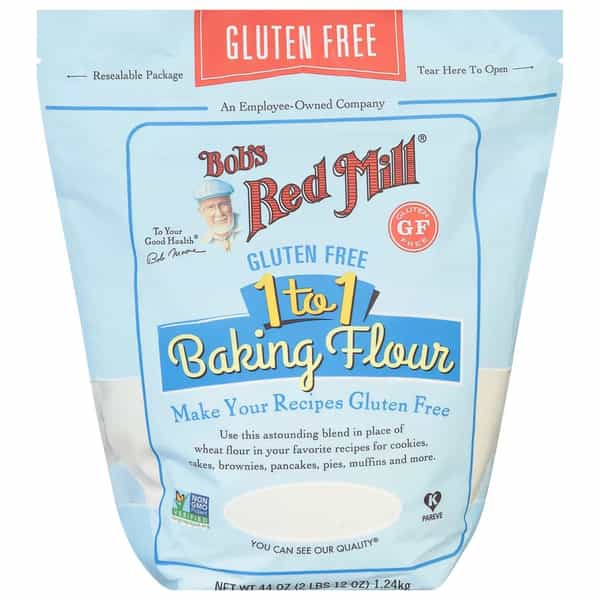Are you tired of settling for lackluster gluten-free pizza options that leave you wanting more? Does the dough taste like a flavorless cracker that falls apart by just looking at it? Well, get ready to elevate your pizza game because we're diving into the realm of homemade gluten-free pizza that's bound to satisfy your cravings and tantalize your taste buds. If pizza is your comfort food, know that now you’ll have a delicious homemade recipe to keep on hand for whenever that craving arrives - without the constraints of gluten!
You may have stumbled upon countless gluten-free pizza recipes promising the moon and stars but failing to deliver on taste and texture. Fear not, because we've got the recipe that will put those disappointments to rest. This gluten-free pizza recipe is a game-changer, delivering a crust that's crispy on the outside, chewy on the inside, and bursting with flavor. No one would even guess that it’s gluten free!

Common Questions About Gluten-Free Flours and Doughs
Can I use any gluten-free flour for this recipe?
While you may come across various gluten-free flours in the market, not all are created equal when it comes to baking. This recipe calls for a specific brand of gluten-free flour that contains xanthan gum, carefully chosen to achieve the desired texture and flavor. Substituting with a different blend may alter the results.
What role does xanthan gum play in gluten-free baking?
Xanthan gum is a common ingredient in gluten-free baking as it helps mimic the elasticity and texture that gluten provides in traditional recipes. It acts as a binder, improving the overall structure and chewiness of the dough.
How do I know when the dough is ready?
Gluten-free pizza dough may behave slightly differently from traditional dough due to the absence of gluten. The dough should be soft, slightly sticky, and easy to work with. It may not rise as much as traditional dough but should still increase in volume when baking. Trust your instincts and adjust as needed to achieve the desired consistency.
Why do I need to let the dough rest?
The key to getting the dough to be the perfect texture is letting everything rest together. As the dough rests, it will slightly rise and the yeast will have a chance to do its magic. Without letting the dough rest, it may not rise as much when baking and won’t have the chew we’re looking for to mimic traditional pizza dough.
The Key to Making The Best Gluten-Free Pizza
Bob’s Red Mill 1-to-1 Baking Flour - not all gluten-free flours are made equally, and this one contains xanthan gum which helps give us the right texture for pizza.
 Cornmeal - helps bind everything together to create the perfect texture.
Cornmeal - helps bind everything together to create the perfect texture.
Yeast - essential for getting the pizza to rise.
Butter - while it’s not absolutely necessary for the dough, it definitely sets this dough apart from others.
This recipe makes two 12-inch pizzas to enjoy.
Prep Time: 15 minutes
Cook Time: 10-15 minutes
Inactive Time: 1 hour
Total Time: About 1 hour 30 minutes
2.25 cups Bob's Red Mill 1-to-1 Baking Flour or Gluten-Free Baking Flour
1.5 teaspoons yeast
1 teaspoon salt
1/4 cup cornmeal
1 teaspoon sugar
1/2 to 3/4 cup water
1 tablespoon softened butter
Toppings of choice
Note: I always recommend buying block cheese and shredding it yourself, as it will melt better than pre-shredded cheese, and taste better, too!
Prepare the Dough:
1. In a large bowl, combine 1/2 cup water, yeast, and sugar. Stir well and let it sit for 10 minutes until it becomes frothy.
2. Add the flour, cornmeal, and salt to the yeast mixture. Mix thoroughly.
3. Slowly incorporate water (a tablespoon at a time) until the dough forms a cohesive ball. The amount of water needed may vary slightly.
4. Allow the dough to rise for one hour. You can let it rise in a warm spot, like a microwave with plastic wrap covering the bowl.
Roll Out and Shape the Dough:
5. After the dough has risen, roll it out onto a floured surface. Divide it into two equal portions. This dough is suitable for two 10-12 inch pizzas, depending on your preferred thickness.
6. Spread the softened butter evenly over the surface of the dough and knead it for about 5 minutes. This step adds flavor and texture to the crust.
7. Place the divided dough portions in the refrigerator while you preheat the oven. Chilling the dough helps it firm up slightly and makes it easier to handle.
Preheat and Bake:
8. Preheat your oven to 425°F. If you have a pizza stone or baking steel, you can increase the temperature to 500°F for a crispier crust.
9. Roll out each portion of dough to your desired thickness on a lightly floured surface.
10. Top the dough with your favorite pizza sauce and desired toppings.
11. Bake the pizzas for 10-12 minutes at 425°F or 8-10 minutes at 500°F until the crust is golden brown and the toppings are bubbly and cooked to perfection.
This year, please say goodbye to subpar gluten-free pizza dough! This recipe is the perfect one to keep on hand and will easily impress all of your gluten-free friends and family. Being gluten-free shouldn’t mean leaving your favorite comfort foods behind - and this recipe is proof of that!
If you are living gluten-free, don't miss The Chopping Block's Hands-On Gluten Free Comfort Food on Wednesday, February 21 at 6pm. With helpful and skilled staff members, there is nowhere else I’d rather go to learn more about cooking - and nowhere else I’d have a better time doing it!
If you happen to be on Weight Watchers like me and are curious about the WW points for this recipe, head over here to check out how many points this is for your plan!











